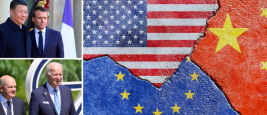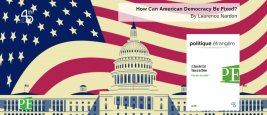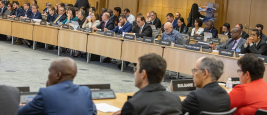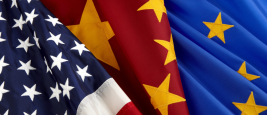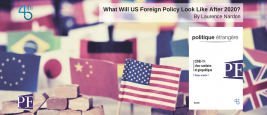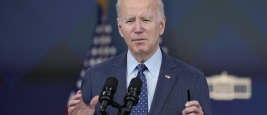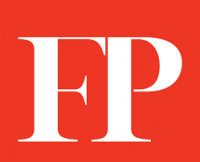
Laurence NARDON
Research Fellow, Head of Ifri's Americas Program
Research Interests:
- North American political systems and political philosophies
- U.S. foreign policy and transatlantic relations
- US trade policy evolutions and relations with China
Dr. Laurence Nardon heads the Ifri program on Americas. She edits and contributes to its collections of online research papers, such as the U.S.-focused Potomac Papers. Laurence is a member of the editorial board of the reviews "Politique étrangère" and "The Washington Quarterly". In association with Slate.fr and the newsletter "Time to Sign Off" (TTSO), she is the author of a weekly podcast on U.S. politics and policies called "New Deal" (formerly "Trump 2020"). It is available every Wednesday, in French.
Prior to joining Ifri, Laurence was a research fellow at the Ecole des Hautes Etudes en Sciences Sociales (EHESS), then a Visiting Fellow at the Center for Strategic and International Studies (CSIS) in Washington, DC from 2001 to 2003. Laurence Nardon holds a Ph.D. in political science from Université Paris-1 Panthéon-Sorbonne. She studied at the University of Kent at Canterbury after graduating from Institut d’Etudes Politiques de Paris. In the Fall of 2000, she was a Fulbright Scholar at The George Washington University in D.C.
As French President Emmanuel Macron (accompanied by Ursula von der Leyen) is on a state visit to China, some twenty Ifri researchers decipher the stakes of the U.S./China/Europe strategic triangle.
The Biden Administration has succeeded this summer in passing several important pieces of legislation. In addition to progressive societal measures that break with the Supreme Court's rulings, the Administration has focused on the economy and the environment: the CHIPS Act and the Inflation...
As a consequence of the positive momentum in Transatlantic relations brought about by the arrival of the Biden administration, significant progress is expected on a range of key digital issues.
The end of the Trump presidency has demonstrated both the strength of institutions and their weakness.
The Organisation for Economic Co-operation and Development (OECD) is conducting important negotiations this spring to reform international taxation.
Some twenty international personalities from different horizons and backgrounds were asked to reflect on the impact of the Biden presidency for the future of European strategic autonomy.
One of Donald Trump’s campaign promises in 2016 was to end China’s “cheating” on trade and to reduce America's trade deficit by imposing significant tariffs on U.S. imports of Chinese products. This study draws up a first assessment of his policy - and of the "trade war" which stemmed from it....
As international relations are increasingly reorganized around the US-China rivalry, the tensions between these two great powers are shaping a growing number of sectors, and the exchange of sensitive technologies in particular. This is a critical issue for European companies today. <...>
The results of the US presidential election in November 2020 are very uncertain.
Since Donald Trump’s rise to power, American foreign policy has become more unpredictable. Nonetheless, several coherent strategies stand out, in particular those that advocate a nationalist approach. An examination of Trump’s entourage also reveals some more conventional figures, who may...
As the incumbent US president prepares to run for a second term, Americans are not convinced that the Biden administration has improved their lives, despite flattering macroeconomic data, Stéphane Lauer writes.
President Macron is set to become the first world leader to make a state visit to the US during the Biden presidency, to the delight of Paris. Following the announcement on Tuesday, some commentators claimed that France was being “pampered” by the US, while others drew a contrast with...
Watch the video replay of the conference organized by Ifri's Geopolitics of Technology program on November 18, 2021.
Born of a revolution fought for liberty, ties between the United States and its oldest ally, France, have long been fraternal, but they've also been marked by deep French unease over their equality.
Recent months have seen the United States and its allies step up their assertiveness toward China, with support voiced for Taiwan, a new deal to provide Australia with nuclear submarines and a new European strategy for increased presence in the Indo-Pacific, according to the Associated Press.<...>
PARIS — President Emmanuel Macron was put on the spot this year in front of a room full of journalists when one asked, provocatively: Which man is more dangerous, North Korea’s leader, Kim Jong-un; or Donald J. Trump?
The provocative, contemptuous and threatening style of the American president even irritate Republicans. Facing his overflows at the national and international levels, what mechanisms could limit the potential damages ?
PARIS — When the State Department released its annual human rights report last week, it contained many of the usual tough American judgments of other countries. Iran was criticized for restricting freedom of...
Donald Trump's xenophobic rethoric draws the support of white supremacists.




